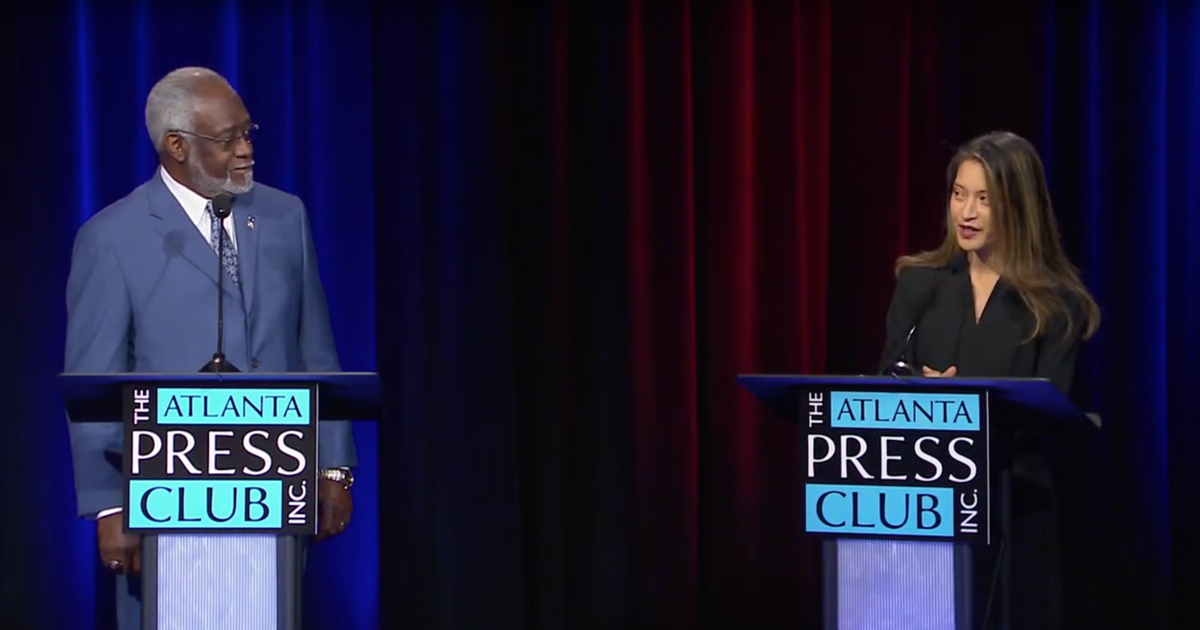
Screenshot via GPB/Atlanta Press Club
While Republican candidates for Georgia secretary of state found themselves trapped Monday in the same echo chamber of bogus 2020 election fraud theories we saw in Sunday’s gubernatorial debate, Democrats vying for the state’s top voting systems job pitched their strategies for changes that, they said, could strengthen the cornerstone of democracy: voting rights.
During back-to-back debates hosted by the Atlanta Press Club and Georgia Public Broadcasting, candidates from both parties sought to hone in on ways to strengthen election integrity.
But where the Democratic contenders—state Rep. Bee Nguyen, former state Rep. Dee Dawkins-Haigler, ex-state Sen. Floyd Griffin, former Fulton County commission chairman John Eaves, and cybersecurity engineer Michael Owens—politely proposed elections system fixes, even teeing one another up for the occasional political lay-up, most of the Republican candidates—including Congressman Jody Hice, former Alpharetta Mayor David Belle Isle, and former Treutlen County probate judge T.J. Hudson—bullied incumbent candidate Brad Raffensperger, pushing the same bonkers claims of 2020 election rigging former President Donald Trump refuses to let go of. It was awkward.

Screenshot via GPB/Atlanta Press Club

Screenshot via GPB/Atlanta Press Club
And though the allegation that the 2020 election was “stolen” rightfully sends eyes rolling into the backs of heads, Georgia’s voting system is far from perfect, according to Marilyn Marks, executive director of the nonprofit Coalition for Good Governance.
“While there has been no evidence presented of election rigging or widespread fraud, the fact that the inaccurate claims are still so pervasive in Georgia should tell political leaders that Georgia’s elections need substantial improvement in transparency and verifiability,” she told Atlanta. “If elections are publicly verifiable and transparent to the press, candidates and public, conspiracy theories and false allegations quickly collapse. Georgia leaders have much work to do on that front, which will earn voter confidence.”
Pursuing that kind of reform Monday, during the Democratic debate, Eaves floated a plan for uniform operating procedures for local election boards across the state; Griffin suggested routine hearings with officials from those agencies; Owens said we need to boost technological education that could help prevent cyberattacks from Russia, China, or “domestic terrorists;” Dawkins-Haigler teased increasing the budget for voter education; and Nguyen urged moving to a “hand-marked paper ballot system with an auditable trail where voters are able to discern who they’re voting for.”

Screenshot via GPB/Atlanta Press Club
An hour before, the Republican secretary of state candidates argued in circles over whether Raffensperger’s leadership allowed Biden to best Trump almost two years ago.
Hice jabbed that Raffensperger created “ballot harvesting”—when a third party rounds up absentee ballots and returns them for tallying and tabulation—in Georgia. Not so, the current elections czar countered, saying there’s no evidence of that happening on a substantial scale. Raffensperger said he’s worked to make sure that practice can only take place on government property and under video surveillance, and countered that Hice has done nothing to strengthen voting policy at the federal level.
Despite a battery of hand counts, audits, and other investigations that verified the 2020 election results, Belle Isle detested the soundness of the results, noting officials must regain the public’s trust when it comes to election security.
“Trust in an election is just like trust in any other relationship,” he said. “When you lose trust, it’s hard to gain it back.” He proposed embracing hand-marked paper ballots and getting rid of no-excuse absentee voting.
All five Democratic secretary of state candidates said during the debate that they’d certify the 2024 presidential election results, even if Trump secured a comeback win in Georgia.
Dawkins-Haigler, alluding to Trump’s infamous call to Raffensperger coaxing the Georgia official to “find” enough votes to flip the election results in the then-president’s favor, said she’d be a good sport about the defeat.
“I cannot imagine a President Biden or a President Trump calling a Dee Dawkins-Haigler, because Dee Dawkins-Haigler is about integrity in the office,” she said. “And even though my heart’s desire would be for the Democrats to win, because we’re the only ones with a solid plan, period, who are not trying to suppress the votes of millions of Georgians—in particular, Black people, who are now at two million registered voters. I would still follow the law. This is not an opportunity to use the position to your favor or to sway the election one way or the other.”
And where Raffensperger—like Governor Brian Kemp, during a gubernatorial candidate debate on Sunday—touted new Georgia voting laws enacted by the controversial Senate Bill 202, which imposed new restrictions on hitting the ballot box, as a saving grace for election integrity, the Democrats each outlined plans to let the measures die by way of litigation.
SB 202 faces a barrage of legal challenges, and the next secretary of state would be the defendant in those lawsuits. Griffin said of the bill “all of it should be repealed;” Nguyen said it violates the federal Voting Rights Act; Dawkins-Haigler called the new laws “unconscionable.”
All said, the fate of Georgia’s elections system hinges on the results of the November election, and the winner could determine how residents pull the lever for years to come. Early voting is underway, and the primary election is on May 24.
Watch the full debates below:













